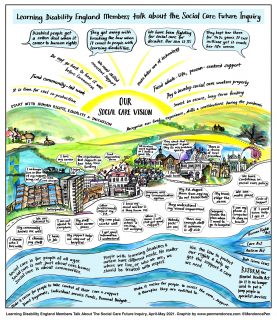 Blog by Sinead Mchugh-Hicks, Executive Director of support at Advance Housing & Support
Blog by Sinead Mchugh-Hicks, Executive Director of support at Advance Housing & Support
 This is part of the Future of Social Care series of members’ thoughts and views.
This is part of the Future of Social Care series of members’ thoughts and views.
Find out more about Learning Disability England’s work on the future of social care here
“I joined Advance in December 2020 but have worked in the sector for many years.
Joining an organisation in the middle of a global pandemic was daunting and challenging – but what I have seen in the care and support provided by Advance has really inspired me.

This week I visited people we support in Essex.
Having not had the opportunity to get out and about very much due to the timing of my joining, I felt nourished by spending time with people and the interactions I observed, the stories I was told and the compassion and respect that was evident between the people I met and their support workers.

However, there was something that left me feeling a little sad, the mask.
I have worked in social care since 2002 and I have never worn a uniform. Even then, we tried to be discreet about our ID badges and our paid roles in people’s lives, we tried to be human about our work.
As a Support Worker, part of my role was to help people be a part of their community, not to draw attention to their disability but their ability, their contribution.
Whilst visiting people this week, there was a clearly visible difference between Customers and Colleagues – those wearing a mask and those not. The mask serving as a physical reminder, a uniform, ‘I am paid to be here, you are vulnerable’.
 I have spent years explaining that most of the people we support are not ill, they are not patients, they are people, who need a little support with some aspects of their lives but now, we risk taking big steps backwards.
I have spent years explaining that most of the people we support are not ill, they are not patients, they are people, who need a little support with some aspects of their lives but now, we risk taking big steps backwards.
If you have a learning disability or mental health need you are vulnerable, you need a bit more cotton wool than everyone else, you can’t take the same risks as others, government guidance makes decisions about what happens in your home.
We still await the Government’s detailed proposal to reform social care. The Health and Social Care white paper and the National Disability Strategy failed to deliver on this but whilst we continue to wait, people’s lives, the only life they have, is on hold.

So, what can we do instead of waiting for the reform we wish to see?
We need to be it, lead it, make it happen in our everyday lives, our interactions, our language, culture and dare I say policies.
Let’s stop talking about co-production and ensure it’s just what we do, that everything is done with respect, driven by the individual, for the individual, enable them to control their own care and support no matter how it is funded or where they live.
Make sure all services are working together and hold them (and ourselves) to account when they are not.
Ask yourself, who’s social care is it anyway?”
Sinead Mchugh-Hicks is Executive Director of support at Advance Housing & Support providing services across England.